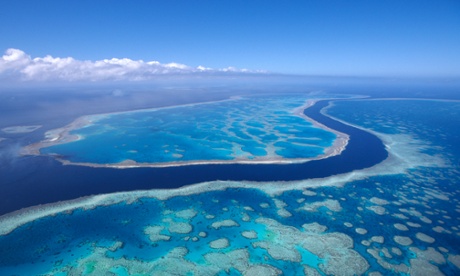by Graham Readfearn, "Planet Oz," The Guardian, January 31, 2014

The Great Barrier Reef. Photograph: Grant V Faint/Getty Images
There's a phrase environmental scientists and campaigners like to use to talk about the slow and relentless degradation and destruction of habitats and natural wonders.
"Death by a thousand cuts," they call it, as small chunks of habitat are lost and environmental laws are eased or repealed. A bit of bush here for a tourism development, a stand of mangroves there for a beachside resort. An entire nature reserve for a coal mine. Sometimes, the threats come like pincer movements with all angles covered.
For the Great Barrier Reef, though, the world's most famous and largest coral reef system, a final decision passed down today gives us another gash, through which could rush millions of tonnes of coal.
The reef is being threatened from all sides. Dredging for coal and gas ports. Increased shipping frequency. Run off from agricultural developments. Increased ocean acidity and rises in sea temperatures from fossil fuel burning. The threats have got the reef surrounded.
Now the government's Great Barrier Reef Marine Park Authority (GBRMPA) has decided to allow up to three million cubic metres of ocean bottom to be dredged and then dumped within the borders of the marine park and also the Great Barrier Reef World Heritage area.
The decision is another necessary block removed in order to liberate millions of tonnes of coal from Queensland's Galilee Basin, where miners hope to then rail it to shore and load it onto containers at an expanded coal terminal at Abbot Point. The dredging is to make way for the ships as they weave their way through the Great Barrier Reef – a wondrous icon of the blue planet that doubles as the world's most iconic coal shipping lane.
Most of the coal is destined for Asia and India, where it will be burned, releasing more greenhouse gases to warm the oceans and the atmosphere.
The dredging work at Abbot Point had already been approved by environment minister Greg Hunt back in December, despite concerted pressure from environmental campaigners.Even before that, the UN's World Heritage Committee had sent a delegation to inspect the "property" after reports of a ramping-up of projects on the reef's coastline to facilitate a boom in coal and gas exports.
Attention then turned to GBRMPA, who were given the task of making the final decision. Questions were raised about the potential for conflicts of interest within GBRMPA, after an ABC 7.30 Report pointed out that some of the board members had connections to the coal industry.
WWF also produced a scorecard earlier this week on the federal and state governments' performance in protecting the reef and – not surprisingly – awarded a big fat fail. The group said:
Of the seven detailed recommendations from the World Heritage Committee the Australian and Queensland governments have failed to make "good progress or completed" any of them.
But today, GBRMPA gave the go ahead for the dredging project.
Greenpeace Reef Campaigner Louise Matthiesson said the decision was "one more body blow for the reef which further threatens marine life, its World Heritage status and Australia's tourism and fishing industries." Felicity Wishart, Great Barrier Reef campaign director with the Australian Marine Conservation Society, said: "Most Australians will be shocked and angry at this decision by the Marine Park Authority and Minister Hunt to allow dumping of dredge spoil in Reef waters. Across the board, people expect them to defend the Reef, not approve its destruction."
WWF Great Barrier Reef Campaigner Richard Leck said it was a "sad day for the reef and anyone who cares about its future. The World Heritage Committee will take a dim view of this decision which is in direct contravention of one of its recommendations."
GBRMPA itself said the approval was in line with its view that projects within existing port developments could be approved.
So attentions will now turn to the World Heritage Committee meeting in June in Qatar, where the committee will decide if the reef should sit on the "in danger" list next to sites such as the Belize section of the Mesoamerican Reef (the world's second largest reef system). Also on the "danger list" is all five of the Democratic Republic of Congo's World Heritage sites.
Leck told me: "We would argue strongly that this is a development outside port limits and it does contravene the World Heritage Committee's recommendation around ports."
As I explained last year, scientific research on the reef suggests that it is already in danger from human-caused climate change and ocean acidification.
Approving just two of the coal mines in Queensland's Galilee Basin, which would push coal through the dredged area at Abbot Point, would add emissions equivalent to six times the annual carbon footprint of the UK.
For the reef, it is not so much the risk of "death by a thousand cuts" but more "death by millions of cubic metres of sludge and billions of tonnes of carbon dioxide." All approved.







No comments:
Post a Comment